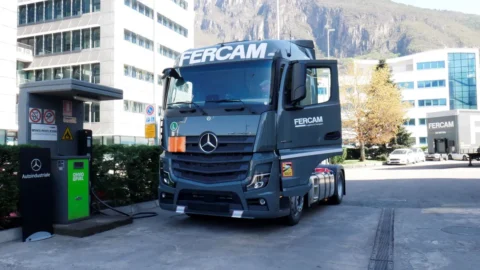Luigi Ferraris, Chief Executive Officer of Italian State Railways, participating in a seminar on the "Economic intelligence in the digital age” organized by Luiss of Rome, discussed the importance of big data in the acquisition, processing and protection for the defense and expansion of the company in the domestic and international railway market.
Ferraris: "Towards a single high-speed market"
Ferraris stressed that Central European countries are progressing “towards a single high-speed market“, with advanced infrastructure that will make it possible to connect Berlin to Paris in 4-5 hours. From this evolution arises the importance of knowing scenarios and markets: "before entering the French market we carried out a careful analysis of the data, even if not all the information was available" said Ferraris - "On our Frecciarossa Milan - Paris we had expected a demand that we thought we could satisfy by filling our trains to 60-70%, instead we are currently over 80%”. A great success that must be defended and consolidated.
"We have to measure the quality of the service with every useful tool, monitoring the reactions of our travelers on social networks and analyzing the data that our customers allow us to use and that we have a duty to protect” declared the CEO of FS. Ferrovie dello Stato Italiane has a database with over 9 million customers, with 5 million having given their consent to data processing.
Not only mobility but also infrastructures
During his speech, Ferraris underlined how the FS Group don't just limit yourself to mobility of people, but also extends to the upgrading and building infrastructure, station management, integrated mobility and logistics and urban areas. Furthermore, the FS Group is working to become a connectivity enabler thanks to the extension of the optical fiber along its 17.000 kilometers of tracks. In all these business areas, data acquisition and processing are of key strategic importance, as are digital processes and efficient connectivity to improve the quality of rail journeys.
"We need to digital infrastructure for goods, for real-time monitoring of their transport, as well as for monitoring the state of infrastructure, and we need someone who can read and process this data. We need analysts and a research center that we have (FS Research Centre) but then you need reaction speed, the ability to capture trends, interpret them and also to intercept commercial traffic” Ferraris explained.
Italy as a logistics platform in the Mediterranean
At the end of his speech, Ferraris paid particular attention to trade, logistics and the international scenario. He talked about Italy's role as a logistics platform in the Mediterranean, of southern ports such as Gioia Tauro and of the evolution of the geo-political scenario, with an increasingly important role of the countries of North Africa in the social and economic dynamics of Europe.
The panel in which Ferraris participated was moderated by the Bloomberg journalist, Alessandra Migliaccio, and featured the participation of Paul Scudieri, president of the Adler Group, Flavio Valeri, president of Lazard Italia, e Leonardo Bellodi, corporate secretary of Enel.
Ferraris: "Attracting private capital into infrastructure"
Ferraris also spoke at the 52nd National Youth Conference of Confindustria in which he outlined a overview of mobility development of the country. “We need to think about how attract investors and private capital also in the infrastructure sector because in the next 15 years we will face the challenge of modernizing our roads and railways with hundreds of billions of euros”.
Ferraris pointed out that theopenness to private investment must be accompanied by solutions that “allow the State to always keep control of the companies involved". This approach would ensure a balanced public-private partnership, in which the private sector contributes capital and know-how, while the state maintains a strategic oversight role.
The need for infrastructure modernization
The CEO then highlighted how the FS Italiane Group is already engaged in major investments, with 4.000 active shipyards from the total value of 50 billion euros, involving 500 companies. The current Italian infrastructures, designed and built over 50 years ago, require significant modernization to adapt to current and future mobility needs. "There Nimby syndrome it has been replaced by the requests of the territories to have new infrastructures” – explains Ferraris. The industrial plan of FS over the next ten years it foresees works for 125 billion euros on the railway side and 50 billion for the 30 thousand km of roads managed by Anas. And then a opinion on the Pnrr which can give "a necessary boost from a financial point of view and on the method of making investments, but then we must continue because we cannot run the risk of deindustrializing the country"
Finally, an opinion on future challenges deriving fromtraffic increase which, according to Ferraris, will not only concern passenger transport, but will have a significant impact also on freight transport, where most travel on roads and highways. “We will have an inevitable increase in traffic with 700 new heavy vehicles on European roads. If we associate these numbers with the fact that 1,5 million licensed people in Europe will retire in the next three/four years and 125 get licensed every year, we obviously have to push on infrastructure for greater sustainability of the system and also to avoid congestion of the roads.





